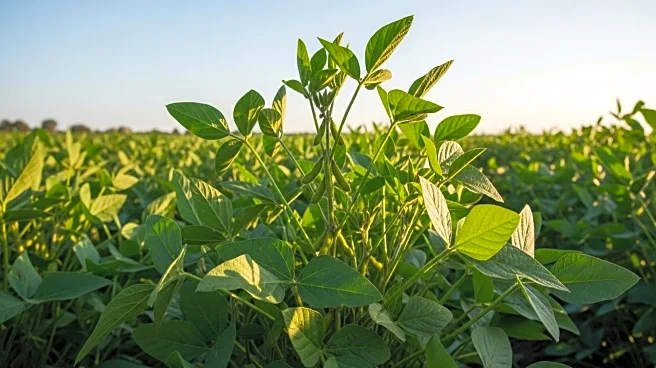What's Happening?
A recent analysis has revealed that over 97% of Mato Grosso's soybean cultivation area meets the European Union Deforestation Regulation (EUDR) standards, which will be enforced starting December 31, 2025. Mato Grosso, Brazil's largest soy-producing state, accounts for approximately 27% of the country's soybeans. The study, conducted by MosaiX, examined major soy farms in the state against EUDR criteria, including no forest clearing post-December 2020, valid legal registration, and no overlap with protected areas. The findings show that 97.21% of the farmland is compliant, with only 2.79% flagged as non-compliant due to post-2020 forest clearance or unclear land registration. This compliance is seen as a positive example for other regions, demonstrating that large-scale agriculture can align with environmental goals.
Why It's Important?
The high compliance rate of Mato Grosso's soybean production with EUDR standards is significant for global supply chains, as it ensures that soybeans from this region can continue to be exported to the EU without facing restrictions. This development highlights the potential for large-scale agricultural operations to meet stringent environmental regulations, which could influence other regions to adopt similar practices. The reduction in deforestation within Mato Grosso also contributes to global efforts to combat climate change and preserve biodiversity. Companies involved in the supply chain, including plantation companies and biofuel producers, stand to benefit from continued access to the EU market, while non-compliant areas may face economic challenges if they fail to meet the standards.
What's Next?
To ensure full compliance with the EUDR by the end of 2025, Mato Grosso must address challenges such as achieving complete farm-to-port traceability, maintaining continuous monitoring to prevent new deforestation, and accelerating land registration for unregistered farms. Stakeholders, including government agencies and agricultural companies, will need to collaborate to overcome these obstacles. The successful implementation of these measures could serve as a model for other regions facing similar regulatory requirements, potentially leading to broader adoption of sustainable agricultural practices.
Beyond the Headlines
The compliance of Mato Grosso's soybean production with EUDR standards may have deeper implications for the agricultural sector, including the potential for increased investment in sustainable farming technologies and practices. The focus on environmental compliance could drive innovation in monitoring and data analysis tools, benefiting not only soy producers but also other agricultural sectors. Additionally, the emphasis on legal land registration and protection of forests may lead to improved governance and transparency in land use, contributing to long-term environmental and economic sustainability.










